Defining functions
Functions are just another type of expression in Mathematica
Their argument lists take the form of patterns. We will discuss patterns in more depth in the next lecture
For now, we will make use of one kind of pattern: x_
which matches any expression and calls it x.
For example:
![]()
This function can be called with any kind of argument. That argument will be called x in the body of the function, which gives a result by adding one
![]()
![]()
![]()
![]()
There are much more sophisticated patterns than just “match any expression.” We will cover these later.
Suppose we want to recursively compute the factorial
Base case: fac(0) = 1
Recursive definition: fac(n) = n*fac(n-1)
This is simple to define in Mathematica.
We begin with the base case
![]()
Now, fac[0] will evaluate to 1
![]()
![]()
We don’t have a rule for the general case, so fac[n] will remain unevaluated:
![]()
![]()
Defining the general case:
![]()
![]()
![]()
![]()
![]()
![]()
![]()
Let’s do a similar exercise with the Fibonacci sequence: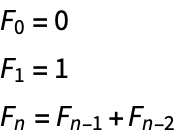

![]()
![]()
Of course, Mathematica also has this built in, so we can check our work...
![]()
![]()
Solving recurrence relations
Suppose we have the recurrence relation

We can easily create a function to recursively evaluate this sequence

![]()
![]()
What if we want to know a general (non-recursive formula)?
First, concentrate on the recursive definition ![]() (ignoring boundary conditions)
(ignoring boundary conditions)
We can solve this recurrence by making the ansatz that ![]() is given by
is given by ![]() for some r
for some r
In that case,
![]()
So, we look for solutions to this equation.
![]()
![]()
So, r=5 and r=2 satisfy this relationship.
The general solution will be given by ![]()
We can easily solve the system of equations to find the values of c and d.
But we can also let Mathematica help...
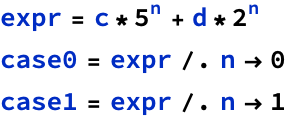
![]()
![]()
![]()
![]()
![]()
Let’s check our formula
![]()
![]()
![]()
![]()
ClearAll deletes all the definitions we made for a
![]()
Mathematica can also solve the recurrence directly using RSolve
![]()
![]()
More complicated functions and local variables
Sometimes we want to introduce local variables in a function for intermediate values in long calculations
This can be achieved using Module
![]()
![]()
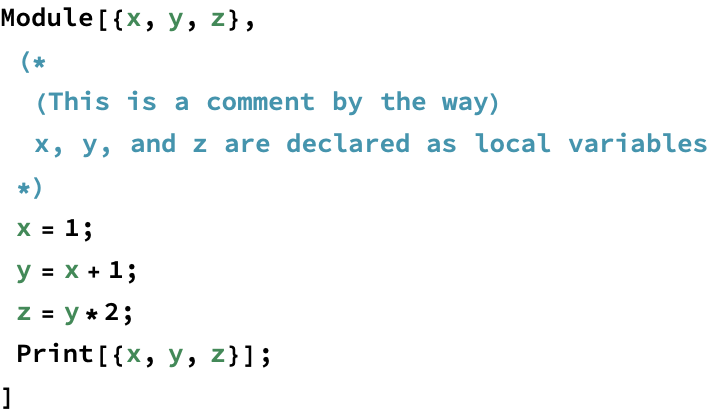
![]()
![]()
![]()
Mathematica also has other scoping mechanisms (i.e. for creating variables with local scope)
See e.g. Block, With
For our uses, Module is sufficient
Functional style programming
Mathematica is a multi-paradigm programming language
It supports both functional and imperative programming, but functional constructs are often very natural
For example, applying a function f to a list is known as mapping f over the list
![]()
![]()
![]()
![]()
Map is considered so important in Mathematica it has its own syntax
![]()
![]()
We can define more complicated functions if we want
![]()
![]()
![]()
Sometimes we want to create an anonymous function so that we don’t need to name it
![]()
![]()
Here # indicates the argument, and & tells Mathematica that the preceding expression is a function
This notation can easily become hard to read, so be careful
![]()
![]()
More functional programming
Recall our list
![]()
![]()
We can apply filters to the list using Select
![]()
![]()
We can combine this with anonymous functions
![]()
![]()
Sometimes we want to apply a function to a list for its side-effect rather than its return-value
For this we have Scan
![]()
![]()
![]()
![]()
![]()
![]()
![]()
![]()
![]()
![]()
![]()
There are a ton more functional programming facilities in Mathematica
See e.g. Nest, Fold, Apply
![]()
![]()
Can we get the sum of all of these entries?
![]()
![]()
![]()
![]()
![]()
![]()
![]()
![]()
![]()
![]()
Patterns
We have seen one type of pattern before: x_
The underscore will match any expression, and then the result will be called x
We can test if a pattern matches an expression using MatchQ
![]()
![]()
![]()
![]()
There are other kinds of patterns.
Except will match anything except what’s in the brackets
![]()
![]()
![]()
![]()
You can match for specific heads of expressions with _h
![]()
![]()
![]()
![]()
Conditions can be added to a pattern with /;
![]()
![]()
![]()
![]()
Boolean functions can also be added with the ? operator
![]()
![]()
![]()
![]()
Patterns can be combined using | for or
![]()
![]()
Type checking
Checking for specific heads allows us to perform type checking

![]()

![]()
![]()
![]()
![]()
![]()
![]()
![]()
Let’s get rid of our old (overly-general) rule
![]()
We want to add a condition to the pattern: only match non-negative integers
![]()
![]()
![]()
Another example
![]()
![]()
![]()
![]()
![]()
Example: defining our own derivative function
We want to differentiate arbitrary expressions
This can be achieved using the basic rules of differentiation:
Linearity
Product rule
Chain rule
We first need the concept of an expression being independent of another expression.
This is achieved using FreeQ
![]()
![]()
![]()
![]()
Some common base cases:
![]()
Addition:
![]()
Scalar multiplication:
![]()
Product rule
![]()
Chain rule
![]()
(Have to be careful in the above not to match f[x] (so make sure g doesn’t match x), otherwise have infinite recursion)
![]()
![]()
![]()
![]()
![]()
![]()
![]()
![]()
If we encounter functions whose derivatives we don’t know, it will leave them unevaluated:
![]()
![]()
![]()
![]()
We can easily add rules for trigonometric functions:
![]()
![]()
![]()
![]()
![]()
Our definitions will automatically work with function composition:
![]()
![]()
![]()

![]()
![]()
![]()
Speed: memoization
Recall our Fibonacci sequence

How fast (slow?) is it?
![]()
![]()
![]()
![]()
![]()
![]()
![]()

![]()
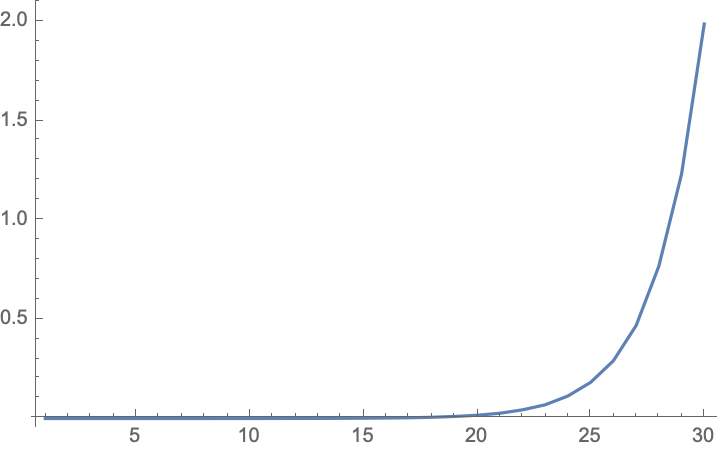
In fact, the runtime for the recursive algorithm satisfies
![]()
and so the time to compute fib[n] is actually given by fib[n]
We can easily find a closed form representation of the Fibonacci sequence (involving the golden ratio) using e.g. the characteristic polynomial
![]()
![]()
![]()
![]()
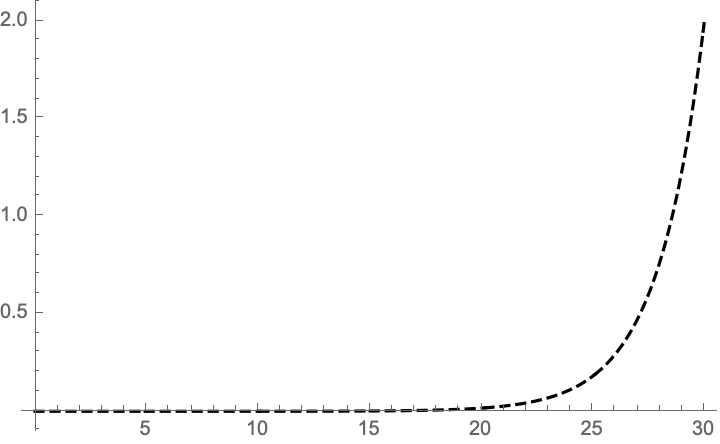
![]()
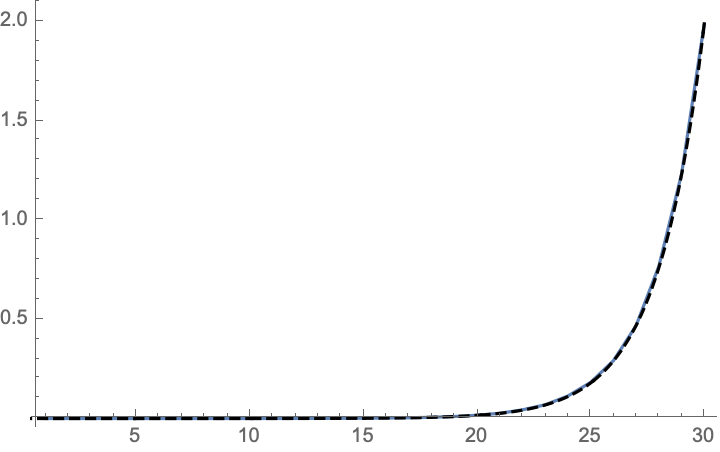
We can try to optimize our recursive implementation using memoization
![]()

Look how many times fib[1] and fib[0] are evaluated! We can speed things up by storing these values
![]()
![]()

![]()

![]()


![]()

![]()
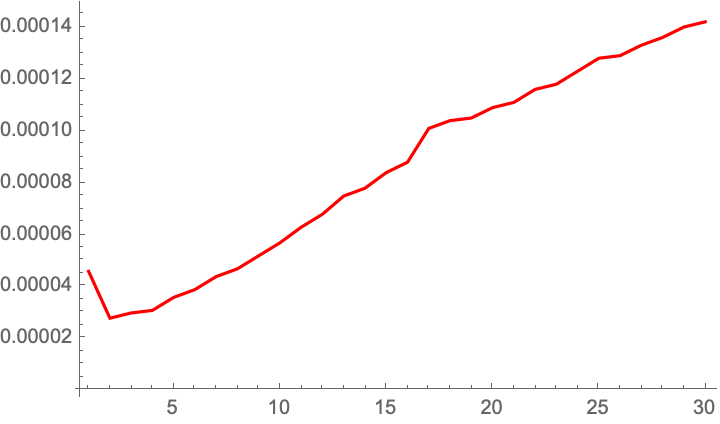
![]()
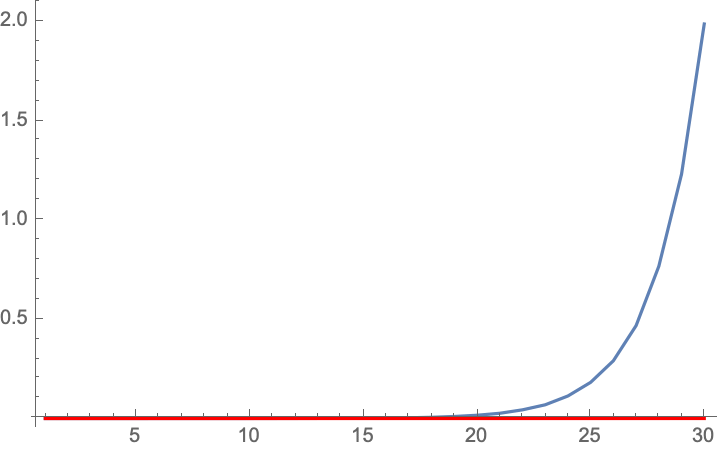
![]()
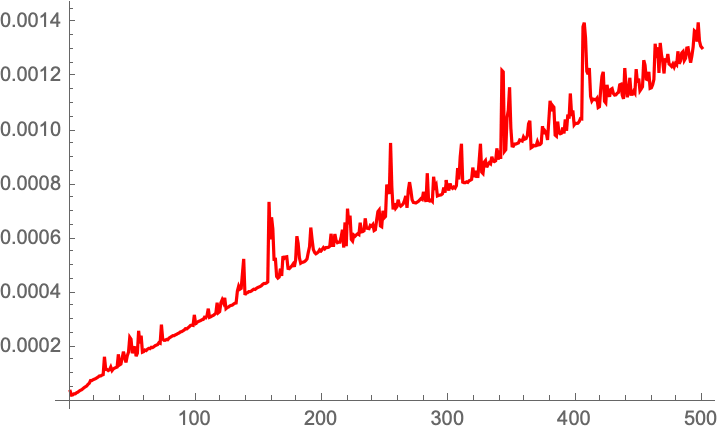
We can see that the timings are linear, which is clear given the recurrence
![]()
